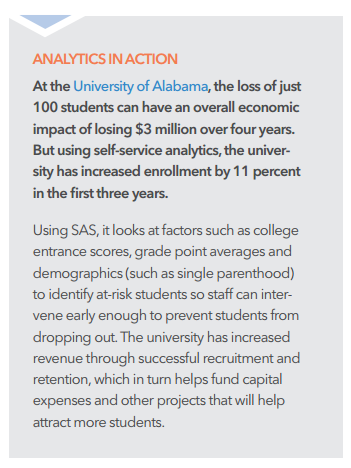Improve retention, improve lives: Why student retention is important to society
Thursday, January 5, 2017
This article appeared Discover Spears Research, the quarterly research newsletter released by the Spears School of Business.

It’s a common issue all universities share, and it’s an issue that affects the entire United States.
For years, researchers have looked in to what causes students to drop out of college one factor at a time. Is it difficulty adjusting to college life? Does past academic success contribute? Is it a lack of commitment? Per Oklahoma State University’s Dursun Delen, a Regents Professor of management science and information systems, it’s all of the above.
“Past researchers have considered the phenomena of student attrition from a narrow perspective, one factor at a time, but we used data mining techniques to observe all of the factors at once, holistically,” Delen said. “We found that while adjustment issues, academic difficulty and isolation all contribute, the most important factor of attrition is the amount of credit hours completed in comparison to the amount of credit hours the student enrolled in their first semester of college. But, it’s a mixture of social and emotional factors as well. It’s a complex issue.”
Delen used existing data from the registrar, enrollment services, academic affairs and other university services involved with the enrollment process to develop and test theories and predictive models. Using state-of-the-art data analytics techniques, including artificial neural networks, decision trees and support vector machines, Delen was able to predict student attrition from freshman to sophomore year with an 82 percent accuracy rate. With this information, universities can start looking at ways to improve retention that doesn’t strain already limited resources.
“Retention is one of the most important measures of success at a university, as it affects rankings, reputation and financial well-being,” Delen said. “But, improving retention is good for everyone. The public economic benefits (increased tax revenue, individual economic benefits, higher salaries), public social benefits (reduced crime rates), and individual social benefits (increased quality of life) are too great to be ignored. By increasing retention just by one percent, we can save millions of public dollars. That’s why understanding attrition is important.”
By being able to identify “at risk” students and looking at the issue from a data mining perspective, universities can better allocate resources to the students needing help through enhancing interaction with campus personnel and connecting the students to the university culture.
“The value of a college degree is well-documented, with benefits of increased earnings, lower unemployment, civic involvement, and the list goes on,” said Christie Hawkins, director of institutional research and information management at OSU. “OSU focuses on recruiting hard-working, outstanding students to attend our institution. As an institution, we are committed to helping students achieve their goal of an OSU degree. This includes additional support services to help students transition during their first year of college, as well as necessary resources to ensure student success to graduation. OSU’s investment in student success initiatives, in turn serves the entire state of Oklahoma by helping create a more educated workforce.”

Delen has been invited to numerous conferences and universities to speak about student success, predicting attrition and improving student retention rates through data mining.
“Dr. Delen’s work recognizes the complexity of student retention, a topic of great importance to colleges and universities, given that fewer than 40 percent of students pursuing bachelor’s degrees finish within four years,” said Pam Fry, vice president for academic affairs and provost for OSU. “In addition, the percentage of bachelor’s degree attainment for young adults has remained relatively unchanged for more than 20 years in the United States. By understanding those variable related to retention, we can create more effective, targeted strategies to support student success and timely graduation.”
Delen completed his bachelor’s and master’s degrees in his home country of Turkey before traveling to the United States to finish his doctorate in industrial engineering and management at OSU in 1996. Prior to his appointment as an Assistant Professor of Management Science and Information Systems at OSU in 2001, he worked for a privately-owned research and consultancy company, Knowledge Based Systems Inc., in College Station, Texas, as a Research Scientist for five years, during which he led a number of decision support, information systems and advanced analytics research projects funded by federal agencies, including DoD, NASA, NIST and DOE. He has traveled all over the world as an invited keynote speaker for conferences, Fulbright scholar or visiting professor. He has been serving on more than a dozen journal editorial boards as an editor in chief, senior editor, associate editor or editorial board member. He has published more than 100 research articles and seven books since his academic appointment at OSU in 2001.
